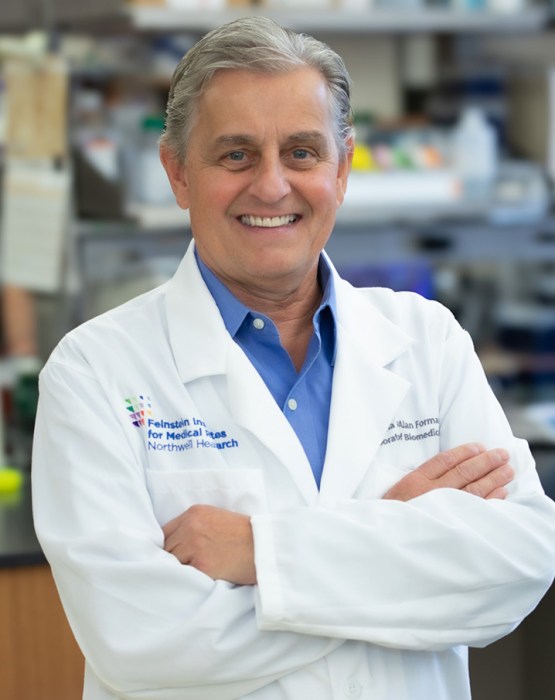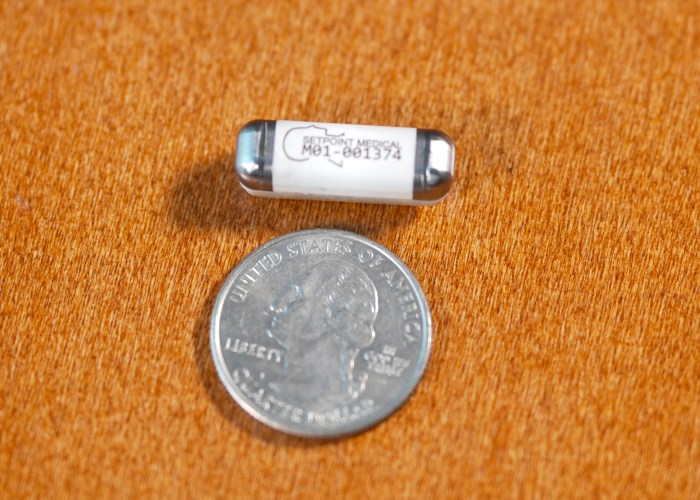Long Island is now the face of bioelectronic medicine.
Northwell Health opened its Center for Bioelectronic Medicine at its Feinstein Institute in Manhasset – making Long Island the first to host this pioneering medical advancement.
“This is the transition of a 30-year research program into clinical practice,” said Dr. Kevin Tracey, president and CEO of The Feinstein Institutes for Medical Research.
Bioelectronic medicine is the practice of combining molecular medicine, neuroscience and bioengineering. It often utilizes technology to target nerves and treat inflammation.
The center is located at 350 Community Drive, where it provides a central location for patients undergoing bioelectronic treatments to be seen and treated.
The bioelectronic center is unlike anything else offered by Northwell Health or beyond, a clinical practice Tracey said he is unaware of being offered anywhere else in the world.

Tracey has been studying bioelectronic medicine for four decades, discovering 25 years ago that the nervous system was the key to the immune system and combatting inflammation. His research in the field was recently published in his book “The Great Nerve.”
In discovering the connection between nerves travelling from the brain to the immune system, Tracey and his colleagues went on to invent devices that can “hack” into those pathways to combat inflammation.
This has been tested through clinical trials, where technological devices are implanted at different points to control the body’s natural system. He said these have proven to be successful.
The vagus nerve stimulation technology for rheumatoid arthritis is one example of bioelectronic medicine, which also includes technologies to treat depression, epilepsy and paralysis. Tracey anticipates FDA approval of the vagus nerve stimulation device within the next weeks or months.
Once it garners FDA approval, Tracey said the technology can then be prescribed to patients.
Dawn Steiner, a 58-year-old speech and language pathologist from Massapequa, is a direct beneficiary of this advancing field.
About 15 years ago, Steiner woke up stiff and in terrible pain.
“I knew something was very wrong,” Steiner said.
With a family history of rheumatoid arthritis, Steiner quickly sought consultation with a rheumatologist and within months was diagnosed.
Rheumatoid arthritis is an incurable autoimmune disease that causes inflammation and pain in the joints.
Steiner was prescribed typical medications for rheumatoid arthritis, but she said they took too long to kick in and would not work for long periods of time.
This sometimes meant six months waiting for a medication to start working just for it to work for about four months before stopping. Then she’d have to wait for it to leave her system and start the process all over again.
“I was barely living,” Steiner said. “It was hard for me to go out and do stuff. I just never felt good.”
About two years ago Steiner was on her eighth failing medication and was looking to see what her next step would be. That’s when she learned of the SetPoint Medical’s RESET-RA clinical trial.
“Although it was a little scary to think about a surgical procedure and all of that, it didn’t seem any less scary to me than all the meds that I had taken,” Steiner said.
A device was implanted on Steiner’s vagus nerve, which is stimulated through vibrations for about one minute a day.
Within a week, Steiner said her quality of life was already beginning to improve.
“This is a very new thing,” Tracey said. “Doctors treating rheumatoid arthritis think in terms of pills and injections as therapies, and physical therapies, of course. Now, doctors and patients will be able to consider whether a computer chip may be the right therapy.”
Now almost two years later, Steiner is feeling the best she has in 20 years.

Since undergoing the trial, Steiner said her pain is at its lowest since her symptoms transpired. While she used to spend most of her free time in bed or on the couch due to debilitating pain, now she can go on walks and take weekend trips.
Steiner spoke on the importance of clinical trials, both for herself and for advancing the field of medicine. She said she was proud to be able to participate in it and considered it an overall positive experience.
“They need people like us to do things like this and give it a try,” Steiner said.
While the center will continue to be a hub for clinical trials as the bioelectronic medical field advances, Tracey said it will also be a place for treatment once clinically trialed practices gain FDA approval and for educating patients on their options.
“It’s not a research center, it’s a clinical treatment center,” Tracey said, saying how it will combine both FDA-approved bioelectronic treatments while advancing clinical trials.
Tracey said another benefit of the center is centralizing all the key players advancing this relatively new field.
“The importance of having a center where people can work through the newness together is critical,” Tracey said. “If you sit back and wait for something truly new to get adopted into medical practice, it can take years or even decades.”
Since launching, Tracey said they have been getting emails every day inquiring about their offerings. He said they are gathering all these contacts right now to begin educational outreach for physicians and patients.
“There’s tremendous pent-up interest,” Tracey said.
Tracey said they will start by focusing on rheumatoid arthritis and vagus nerve stimulation, but their long-term goal is to be an umbrella center for all technological advancements in treating complex diseases through the nervous system.
Although the center was just launched this month, Tracey said they already have plans to expand into Manhattan and elsewhere.
































